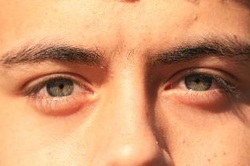
Eye Disease
Few people encounter the term uveitis because it is a rare problem. Nevertheless, awareness should be raised regarding it as it could hit any person, even children. What is uveitis? It is the inflammation and soreness of the uvea. The middle layer of the eye, the uvea is found right in the centre, in between the sclera and the retina;it works as the supplier of blood to the latter.
Uveitis is quite uncommon and people who suffer from it are typically middle-aged; even so, 10% of those afflicted with the disease are, in fact, children. When left untreated, vision loss is a clear possibility because of the scars that develop on the retina and choroid. Uveitis may actually lead to other eye diseases such as cataract, glaucoma as well as macular oedema.
Uveitis is quite uncommon and people who suffer from it are typically middle-aged; even so, 10% of those afflicted with the disease are, in fact, children. When left untreated, vision loss is a clear possibility because of the scars that develop on the retina and choroid. Uveitis may actually lead to other eye diseases such as cataract, glaucoma as well as macular oedema.
Usually, what caused uveitis in an individual is not identified; it could also be idiopathic, happening all of sudden. There are, however, some factors that could boost the risk of acquiring the illness. For example, if a person has autoimmune problems such as skin psoriasis or perhaps rheumatoid arthritis, then he or she is more likely to developing uveitis. Conditions that decline the immune system, such as AIDS or cancer, can also affect the eye, hence the greater risk for uveitis. Other possible elements that may cause the condition are eye infections as well as injuries.
Uveitis signs and symptoms include blurred or cloudy vision, discomfort as well as redness in the eye, headaches due to sensitivity to light, a change in the colour of the iris, loss of peripheral vision, and pupils that don't dilate or constrict. However, in the event of juvenile onset of uveitis stemming from rheumatoid or idiopathic arthritis, the children normally do not feel any indications and their uveitis is not diagnosed until they’ve lost their eyesight.
Uveitis treatments might come in the form of steroids to deal with the irritation. In the presence of an infection, antibiotics would also be in order. When the uveitis is becoming persistent, the person might normally have to go through immunosuppressant therapy.
The key to alleviating uveitis is prompt and proper treatment. When you view yourself or perhaps a loved one displaying some of the abovementioned indications, visit an eye doctor immediately. In the event of a positive diagnosis, ensure that you are taken care of by a doctor who specializes in uveitis, preferably an ocular immunologist educated to treat with immunosuppressant medication.
Even if you feel that your eyes are completely healthy, it’s best to make a habit of regularly opting for an eye check-up. In fact, first detection of any disease gives you much an enhanced likelihood of defeating it.
Source: www.oliviasvision.org is the leading site that provides easy to understand uveitis information like signs and symptoms, tests, treatments, complications as well as medical research.
Uveitis signs and symptoms include blurred or cloudy vision, discomfort as well as redness in the eye, headaches due to sensitivity to light, a change in the colour of the iris, loss of peripheral vision, and pupils that don't dilate or constrict. However, in the event of juvenile onset of uveitis stemming from rheumatoid or idiopathic arthritis, the children normally do not feel any indications and their uveitis is not diagnosed until they’ve lost their eyesight.
Uveitis treatments might come in the form of steroids to deal with the irritation. In the presence of an infection, antibiotics would also be in order. When the uveitis is becoming persistent, the person might normally have to go through immunosuppressant therapy.
The key to alleviating uveitis is prompt and proper treatment. When you view yourself or perhaps a loved one displaying some of the abovementioned indications, visit an eye doctor immediately. In the event of a positive diagnosis, ensure that you are taken care of by a doctor who specializes in uveitis, preferably an ocular immunologist educated to treat with immunosuppressant medication.
Even if you feel that your eyes are completely healthy, it’s best to make a habit of regularly opting for an eye check-up. In fact, first detection of any disease gives you much an enhanced likelihood of defeating it.
Source: www.oliviasvision.org is the leading site that provides easy to understand uveitis information like signs and symptoms, tests, treatments, complications as well as medical research.
